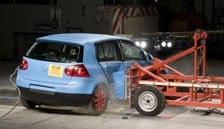Research and training organisation Thatcham is working hard to help fleets better protect their drivers.
From its role on the EuroNCAP board to its guardianship of the car insurance ratings system, it is influential with manufacturers.
But Thatcham recognises the role that fleets can play in helping it increase its influence with manufacturers.
Thatcham is still not consulted early enough in to influence design from a crash repair perspective.
And it can still take manufacturers months to release structural repair methods which Thatcham needs for its repair methodology for body repairers.
Lesley Upham, Thatcham director of communications, says: “Our relationships with fleets and leasing companies have grown. It is useful for us to inform them about our work when we are trying to influence manufacturers’ decisions. They have the biggest chequebooks.”
In other words, fleets can shape manufacturer decisions by buying or leasing cars with the best safety ratings.
For instance, they should only consider cars with a five-star EuroNCAP rating. It now takes into account safety assistance, such as electronic stability control and speed limitation devices, when making its judgement.
Thatcham was instrumental in EuroNCAP’s decision to add whiplash scores to its safety ratings.
And it doesn’t stop there: “We are trying to get EuroNCAP to consider the safety of the vehicle repair and not just for major structural work,” says Thatcham chief executive Peter Roberts.
Thatcham is talking to the European safety body RCAR about creating a system that compares repair ratings for rival models.
Fleets can use it to form their judgments about their choice lists.
Thatcham is testing its own repair methodology via a safe repair project after growing increasingly concerned about the widening gap between production line methods and body repair methods.
Jason Moseley, Thatcham chief operating officer, says: “Some line methods cannot be replicated in the bodyshop, such as laser welding.
"We took three cars – Vauxhall Astra and Vectra and VW Golf – that have unusual technology in their structures and did three types of common repair: front end, side on and rear end.”
Thatcham crashed the cars at EuroNCAP test speeds and compared the results against the EuroNCAP rating. In each case the performance was within acceptable tolerances.
“It proved that if you repair the car in the right way – using approved technicians, original parts and the right methods – there is no risk in a second accident,” says Moseley.
“If the permutations are wrong, the impact could be catastrophic.”
Thatcham will continue testing two or three popular models each year but Moseley believes it will not be long before a car reacts differently in the safety tests to its EuroNCAP rating.
What happens then?
“We will have to alert the manufacturers and work with them to come up with an alternative repair method,” says Andrew Marsh, Thatcham adv-anced data and methods operations manager.
“Then that new method will be introduced to our system and to the manufacturer’s own times.”
#FN_ART_SPLIT#
Thatcham is opening up its methodology process for setting group insurance ratings for new cars after gaining the agreement of the Association of British Insurers.
Manufacturers will be able to see the key components that create the group rating and will be able to make their own predictions for future models.
“This transparency will help manufacturers to target their model development more accurately because they will understand our formula,” says Roberts.
Thatcham is also extending its group ratings into the light commercial vehicle sector from June for the first time.
“There is a huge issue with unsecured goods in vans that will either have direct contact with the driver or would smash through the bulkhead,” says Roberts. “And there are structural implications.”
Clearly, 2009 will be another busy year for the research and training organisation as it continues to develop new initiatives and further extends its global reach.
As if to prove the point, Roberts adds: “Oh yes, we are also planning a big programme to test active safety systems later this year. We need a standard that the driver can understand.”
Awards success
Thatcham collected the Fleet News Award for best safety initiative in 2008 for its Kitemark body repair programme.
To date, 267 bodyshops have been awarded the Kitemark, which ensures safe repairs via a robust standard (PAS125).
One in four of their panel, paint and estimator technicians also needs to have Automotive Technician Accreditation.
Another 309 bodyshops have had initial assessment visits from the British Standards Institute, while almost 1,500 have applied to start the PAS125 process.
On June 18 the Kitemark will be launched to the public.
Lesley Upham has already sold the story into the BBC and is confident the item will be picked up by its breakfast show.
She expects 300-350 body repairers to be Kitemarked by then. Ultimately, she believes that the 2,000 or so repairers in the work provider’s authorised network will all sign up.
Keeping up the good work
Thatcham can influence fleet decisions in a number of areas:
- Vehicle insurance ratings.
- Accident repair methodology.
- PAS125/Kitemark for vehicle body repairs.
- Whiplash ratings.
- EuroNCAP member.
- Bumper ratings.
- ESC fitment ratings.
















Login to comment
Comments
No comments have been made yet.